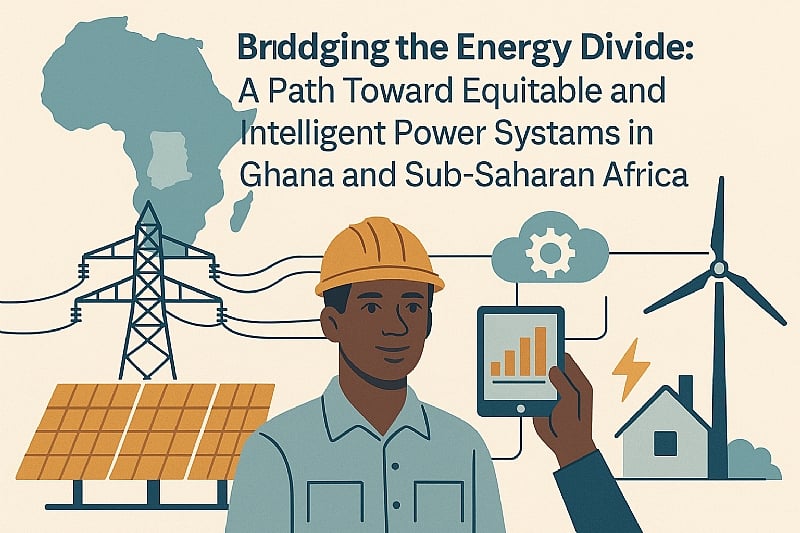The energy landscape in Sub-Saharan Africa, including Ghana, is characterized by a stark paradox: while technological advancements in energy production and distribution are rapidly evolving globally, a significant portion of the population remains energy-deprived. This energy poverty, with over 600 million Africans lacking access to electricity and countless others experiencing unreliable power, acts as a significant impediment to socio-economic development. It hinders industrial growth, limits access to essential services like healthcare and education, and perpetuates the cycle of poverty. This disparity underscores the urgent need for innovative and sustainable solutions to bridge the energy divide and unlock the region’s vast potential.
Ghana, like many nations in Sub-Saharan Africa, faces a growing energy demand that consistently outpaces supply. This imbalance is particularly acute in rural areas where extending the national grid is both costly and logistically challenging. While urban centers may enjoy relatively stable electricity access, they remain susceptible to grid overloads, intermittent outages, and infrastructure maintenance issues. The overreliance on hydroelectric power, susceptible to climate variability, and expensive, emission-heavy thermal generation further exacerbates this fragility. Coupled with inefficiencies in existing systems, including high transmission losses and slow response to faults, the current energy landscape struggles to meet the rising demands of a developing nation. Across the broader Sub-Saharan region, these challenges are amplified by the financial constraints of national utilities, hindering investment in critical infrastructure upgrades and technological advancements. This perpetuates a widening gap between energy-rich urban centers and underserved rural communities.
The path towards a secure and equitable energy future in Africa lies in the adoption of intelligent energy systems, particularly smart grid infrastructure. Smart grids, leveraging automation, digital communication, and real-time analytics, optimize the entire energy supply chain, from generation to distribution and consumption. These systems empower energy providers to accurately forecast demand, efficiently balance loads, and swiftly detect and address faults, significantly improving grid reliability. The two-way communication facilitated by smart grids enables dynamic interaction between consumers and the grid, fostering a more responsive and efficient energy environment. While initiatives like the Ghana Power Compact represent a step towards grid modernization, true transformation necessitates deeper integration of cutting-edge technologies. This includes utilizing artificial intelligence for predictive maintenance, deploying sensors across transmission and distribution lines, and integrating cloud-edge technologies to enhance system intelligence, collectively enhancing reliability, customer satisfaction, and financial stability across the energy value chain.
Decentralization of energy production and distribution, particularly through solar mini-grids and other localized systems, presents another vital strategy for addressing energy inequality. Extending the national grid to remote communities is often economically impractical, making mini-grids, powered by renewable sources like solar or micro-hydro, a more viable and sustainable alternative. These localized systems empower communities with energy independence, driving rural economic development by powering essential services like irrigation systems, schools, healthcare facilities, and small businesses. Several African nations have witnessed the transformative impact of community-based mini-grids, and Ghana’s Renewable Energy Master Plan outlines a strategy for their deployment. However, the long-term success and sustainability of these mini-grid systems hinge on integrating intelligent control systems, providing training for local technicians, and establishing transparent governance models.
Achieving equitable energy access should be a central pillar of development strategies. Energy is not merely a commodity but a fundamental driver of human development, essential for progress across all sectors. Addressing energy inequity requires a multi-faceted approach combining infrastructure investment with targeted social inclusion policies. This entails providing subsidies and financing for rural renewable energy projects, investing in training programs for engineers and technicians specializing in smart grid technologies, and establishing regulatory frameworks that foster innovation and broader energy access. Electrical and Electronics Engineers play a crucial role in this process, advocating for system designs that prioritize accessibility, sustainability, and resilience. Collaboration between government, academia, and industry is essential to cultivate a skilled workforce capable of managing and maintaining these advanced energy systems.
Effective and sustainable energy transformation requires robust and forward-looking policy frameworks. Governments must enforce national grid codes that mandate the integration of smart technologies, ensuring compliance with safety and efficiency standards. Regulatory frameworks should incentivize local production of renewable energy equipment, promote open energy markets, and establish data governance protocols to support analytics and artificial intelligence in energy planning. Encouraging public-private partnerships, supporting rural electrification targets, and establishing financing models that enable small businesses and households to adopt solar technologies and energy-efficient appliances are further crucial policy considerations. Comparing Ghana’s energy sector to that of the United States highlights both challenges and opportunities. While the U.S. benefits from a highly interconnected grid with advanced smart metering and a more liberalized market, Ghana, while facing challenges of a centralized, state-run model with limited digital infrastructure, has the unique opportunity to leapfrog outdated technologies, adopting modern, sustainable, and intelligent systems without the constraints of legacy infrastructure. Learning from the U.S. experience, Ghana can prioritize grid reliability, invest in digital tools, and promote innovation in renewable energy, microgrid deployment, and smart metering, tailoring these solutions to the specific socio-economic context of the country.














